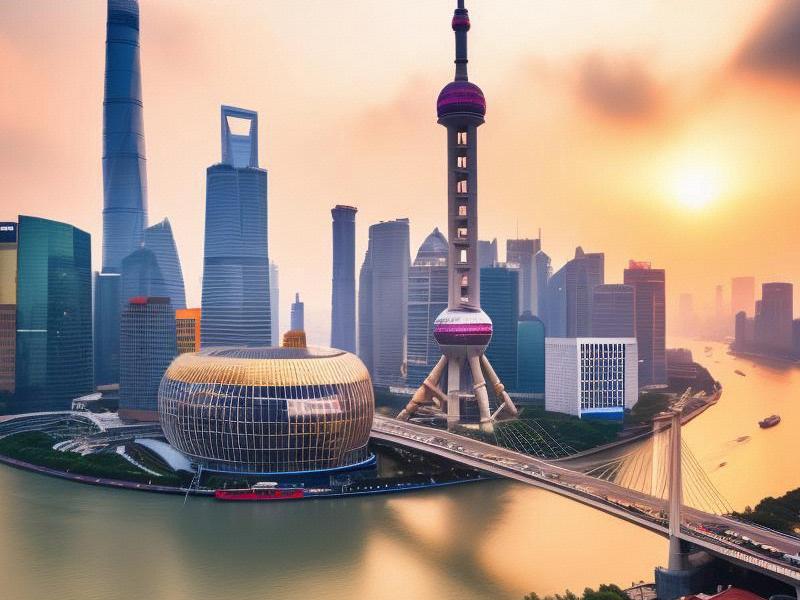
Shanghai, a city that has long been synonymous with China's economic prowess, is a living testament to the nation's remarkable transformation over the past few decades. Once a modest fishing village, Shanghai has risen meteorically to become a global financial hub, a bustling metropolis, and a beacon of modernity. This article aims to provide an in-depth exploration of Shanghai's journey, highlighting its unique blend of tradition and innovation, its vibrant cultural scene, and its ever-expanding global footprint.
Urban Development: A Vision of the Future
Shanghai's urban landscape is a study in contrasts, where ancient architecture coexists with futuristic skyscrapers. The city's skyline is dominated by iconic structures such as the Oriental Pearl Tower, the Shanghai Tower, and the Jin Mao Tower, which stand as symbols of China's economic ascent. These architectural marvels are not just eye-catching but also serve as hubs for commerce, culture, and innovation.
The city's urban planning is a model of efficiency and foresight. The Bund, once a foreign concessions area, has been revitalized into a vibrant waterfront promenade, lined with luxury hotels, restaurants, and shops. Pudong, on the other side of the Huangpu River, has emerged as a symbol of Shanghai's modernity, with its skyline of glass and steel skyscrapers and its world-class financial district.
Shanghai's commitment to sustainability is evident in its green initiatives. The city has invested heavily in public transportation, including the world's first maglev train, which connects the city center to Pudong International Airport. Additionally, Shanghai has been at the forefront of renewable energy and waste management, demonstrating its dedication to creating a livable and sustainable urban environment.
Cultural Diversity: A Melting Pot of Traditions
爱上海419论坛 Shanghai's cultural identity is a rich tapestry woven from diverse threads. The city's history as a trading port has left an indelible mark on its culture, resulting in a unique blend of Chinese and Western influences. This cultural fusion is evident in the city's architecture, cuisine, art, and lifestyle.
The French Concession, with its tree-lined streets and colonial-era buildings, is a preserved relic of Shanghai's past. Today, it is a popular destination for tourists and locals alike, offering a glimpse into the city's colonial history. The Yu Garden, a classical Chinese garden, provides a serene escape from the hustle and bustle of city life, showcasing traditional Chinese architecture and landscaping.
Shanghai's culinary scene is a celebration of its cultural diversity. From the spicy flavors of Sichuan cuisine to the delicate sweetness of Suzhou-style desserts, the city offers a gastronomic journey that reflects its rich heritage. The night markets, with their vibrant atmosphere and diverse offerings, are a testament to Shanghai's culinary vibrancy.
The city's art scene is equally dynamic, with galleries, museums, and cultural institutions showcasing both traditional Chinese art and contemporary works. The Shanghai Museum, renowned for its extensive collection of ancient Chinese art, attracts millions of visitors each year. The city's vibrant theater scene, with its mix of traditional Chinese opera and modern performances, reflects its cultural inclusivity.
Global Influence: A Hub of Innovation and Commerce
Shanghai's global influence is undeniable, as it continues to position itself as a hub of innovation and commerce. The city's strategic location on the East Coast of China, coupled with its well-developed infrastructure, makes it an ideal gateway for international trade and investment.
上海龙凤419足疗按摩 The Shanghai Free Trade Zone (FTZ) is a testament to the city's commitment to economic reform and opening up. Established in 2013, the FTZ has attracted numerous multinational corporations and financial institutions, making it a key player in global trade. The zone's innovative policies, such as the implementation of the negative list for foreign investment, have streamlined business operations and enhanced the ease of doing business.
Shanghai's role in global finance is unparalleled, with the Shanghai Stock Exchange being one of the largest and most influential in the world. The city is also home to the China (Shanghai) Pilot Free Trade Zone, which serves as a testing ground for China's broader economic reforms.
The city's commitment to innovation is evident in its thriving technology and startup ecosystem. Zhangjiang Hi-Tech Park, often referred to as "China's Silicon Valley," is a hub for high-tech enterprises, research institutions, and startups. The park's focus on fostering innovation has made it a key driver of Shanghai's economic growth.
Challenges and Opportunities
Despite its many achievements, Shanghai faces several challenges that must be addressed to ensure sustainable development. The city's rapid urbanization has led to issues such as traffic congestion, air pollution, and housing shortages. Addressing these challenges requires innovative solutions and a commitment to sustainable urban planning.
上海私人品茶 The city's aging population presents another challenge, necessitating the development of comprehensive social welfare systems and healthcare infrastructure. Additionally, Shanghai must continue to invest in education and talent development to maintain its competitive edge in the global arena.
However, these challenges also present opportunities for growth and innovation. For instance, the city's focus on green technology and sustainable development can position it as a global leader in environmental solutions. Similarly, the growing demand for digital transformation and smart city solutions offers opportunities for Shanghai to lead in technological innovation.
Conclusion
Shanghai's journey from a modest fishing village to a global metropolis is a story of resilience, innovation, and determination. The city's unique blend of tradition and modernity, vibrant cultural scene, and growing global influence make it a fascinating subject of study.
As Shanghai continues to evolve, it must balance its rapid development with the need for sustainability and inclusivity. By addressing its challenges and seizing opportunities, the city can ensure a prosperous future for its residents and a lasting legacy on the global stage.
Shanghai's story is not just about economic growth; it is about the human spirit's ability to adapt and thrive in the face of change. As the city looks to the future, it remains a beacon of hope and inspiration for the world.
